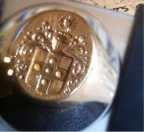Libraries & Books & St. Louis

This is the library, The Carpenter Branch, where my kids learned to love reading, where they earned tickets to the ball game and sat for story hour. It's a short walk from home and it was, for a long time, my connection to the great collection of the St. Louis Public Library. The rehabbed downtown library will be opening soon and I look forward to it. Browsing in the art and architecture stacks always leads to inspiration.
I'm almost done reading The Library, An Illustrated History; the book reminded me about the connection between Carnegie and some of our St. Louis libraries.
I'm fascinated by the price so many have been willing to pay to provide and acquire information. The history of books is the history of power. The printing press has been a great equalizer and the mass production of paper even more so.
The book goes on to describe Carnegie's mission, a debt of gratitude for the library he was given access to as a child, along with his "Gospel of Wealth." He believed the the rich should live without extravagance, provide moderately for the needs of their dependents, and distribute their 'surplus' funds for the benefit of the common man - especially those who endeavored to educate themselves." (P183)
Carnegie made his fortune, in part, due to the labor of those who worked for them and these workers often fought bloody battles against his company during strikes. When he began his work of library building some thought, "Carnegie ought to have distributed his money among his employees while he was making it. No man can accumulate such wealth honorably. It may be legally honest, but it's not morally honest." (P185)
In the 19th century Henry Ward Beecher understood how the cost of books had come down and made them more affordable than ever when he wrote: "...A little library, growing larger every year, is an honorable part of a young man's history. It is a man's duty to have books. A library is not a luxury, but one of the necessities of life." (P181)
Maybe this was the equivalent of the internet. It is access to information and ideas that increase our ability to compete in the market place, but more importantly, to flush out a life in full. It is not the books that fulfilled a duty, but the reading and digesting the information and ideas that change a person, that encourage citizenship, an understanding of the bigger picture, and one's role within that realm.
I keep my personal library around two thousand volumes and I constantly refer to old favorites for continued inspiration. Great books read at age 25 become a benchmark, a way to gauge how we've changed when re-read at 50. I now share my library with my adult children - it makes for some great conversation.



<< Home